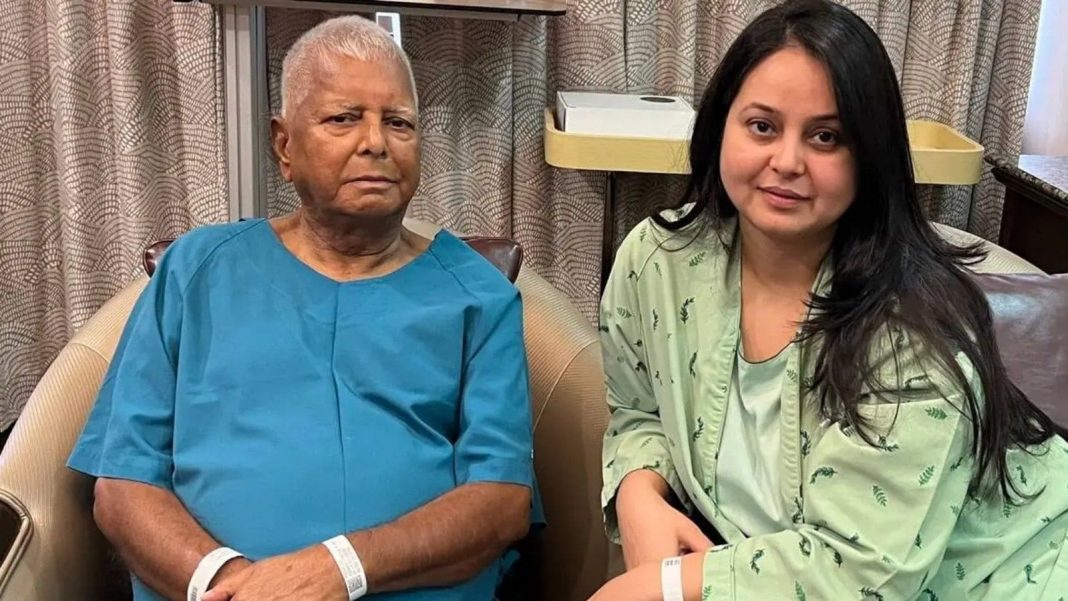The dust is still settling on the 2024 Lok Sabha election results, particularly in Bihar, where the Rashtriya Janata Dal (RJD) faced a significant setback. Amidst this political upheaval, a dramatic announcement has emerged from within the family of RJD patriarch Lalu Prasad Yadav, sending ripples across the state’s political landscape. His daughter, Rohini Acharya, who recently made her electoral debut, has reportedly declared her decision to quit politics and, more startlingly, ‘disown’ her family. This development marks a potentially significant blow to the RJD, already grappling with a rout at the polls and now facing questions about internal cohesion.
The Bihar Rout and Rohini’s Political Foray
The 2024 general elections proved challenging for the RJD, which managed to secure only four seats in Bihar, a state where it once held considerable sway. This performance was a far cry from the party’s aspirations, especially given the extensive campaigning by its heir apparent, Tejashwi Yadav. Among the notable defeats was the Saran Lok Sabha constituency, a traditional bastion of the Yadav family, having been represented by Lalu Prasad Yadav himself and his wife, Rabri Devi. It was from this historically significant seat that Rohini Acharya chose to launch her electoral career, adding a new dimension to the party’s efforts.
Rohini’s entry into direct electoral politics was keenly watched. Having primarily resided in Singapore and been active on social media as a vocal supporter of her father and brother, her decision to contest from Saran signaled a deeper engagement with the party’s future. Her candidacy was perceived as an attempt to reclaim the family legacy in a crucial constituency. However, despite a high-octane campaign, she was defeated by the incumbent BJP candidate, Rajiv Pratap Rudy, by a substantial margin. This loss, particularly in a seat so intrinsically linked to the family’s political identity and the overall poor showing of the RJD, appears to have been a pivotal moment, perhaps fueling the disillusionment that followed.
The “Disowning” Statement and Its Ramifications
Following her electoral defeat, Rohini Acharya took to social media platform X (formerly Twitter) to express her profound disappointment and make a series of startling declarations. In a post that quickly went viral, she reportedly stated, “I quit politics today. I disown this family and the Rashtriya Janata Dal. The struggle was for social justice, not for personal gain.” This unambiguous declaration has sent shockwaves not just through the RJD but across Bihar’s political spectrum, prompting widespread speculation about its underlying causes and long-term implications.
The immediate interpretation points to extreme frustration stemming from her personal defeat and the party’s overall dismal performance. However, political analysts are also exploring deeper possibilities. Some suggest that her statement could reflect growing internal friction within the Yadav family, particularly concerning leadership dynamics and the distribution of political roles. With Tejashwi Yadav firmly positioned as the party’s de facto leader and other siblings like Misa Bharti also active in politics, Rohini’s abrupt exit could signal a fundamental disagreement over the party’s direction or even her own perceived role within it. For a party that has historically leveraged strong family bonds and unity as a political asset, such a public declaration of detachment is particularly damaging.
This unprecedented public disavowal, coming from a family member directly after a significant electoral loss, highlights the immense pressure and emotional toll of political life, especially for dynastic parties. While the RJD leadership has largely maintained silence on the matter, the incident casts a long shadow over the party’s unity and its future cohesion. It raises critical questions about succession planning and whether the RJD, a party long synonymous with the formidable presence of Lalu Prasad Yadav, can navigate these internal challenges while simultaneously rebuilding its electoral strength.
Rohini Acharya’s dramatic announcement represents more than just the exit of a political novice; it symbolizes the intense pressures and potential fractures within one of India’s most prominent political dynasties following a significant electoral defeat. For the RJD, which now faces the uphill task of introspection and resurgence after the Lok Sabha polls, this public ‘disowning’ by a family member adds another layer of complexity to its challenges. As Bihar politics continues to evolve, the ramifications of this development will undoubtedly be closely watched, shaping narratives around family loyalty, political ambition, and the future trajectory of the Rashtriya Janata Dal.




